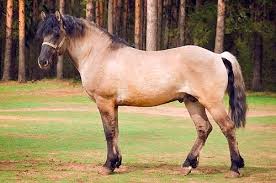
Vyatka
Conditions of detention
Vyatka horses are incredibly hardy and thrive in outdoor environments, even in harsh climates. They are well-suited to living in regions with cold winters, where they can endure long periods of snow and low temperatures. These horses do well in environments where they have access to large pastures, allowing them to graze and exercise freely.
Useful Fact: Vyatka horses are well adapted to cold climates and can live outside year-round with minimal shelter, provided they have access to forage and water.
Nutrition and diet
Vyatka horses are easy keepers, meaning they can maintain their health and condition on a diet of high-quality forage, such as grass and hay. They are efficient at converting roughage into energy, which reflects their adaptation to regions where food is often scarce. They require minimal grain supplementation unless they are engaged in heavy work.
Useful Fact: Due to their efficient metabolism, Vyatka horses are less likely to require supplemental feeding beyond forage, making them low-maintenance in terms of dietary needs.
Health
Vyatka horses are known for their robust health and strong constitution. They are generally free from hereditary health issues and have a natural resistance to many common equine diseases. Regular veterinary care, including vaccinations and hoof maintenance, is necessary to keep them in optimal health.
Useful Fact: Vyatka horses are particularly resilient to harsh weather conditions and are less prone to health issues related to cold and wet environments.
Grooming and care
The Vyatka horse’s thick winter coat requires regular grooming, especially during the shedding season, to prevent matting and ensure the horse’s comfort. Their manes and tails should also be brushed to prevent tangles. Regular hoof care is essential, especially if they are used for work or ridden frequently.
Useful Fact: The Vyatka’s dense coat and mane help protect it from the cold, but regular grooming is important to keep the coat healthy and to check for any underlying skin issues.
Education and training
Vyatka horses are intelligent, willing, and easy to train. They are traditionally used for a variety of tasks, including light draft work, riding, and driving. Their calm and steady temperament makes them suitable for beginners and children, as well as for more experienced riders.
Useful Fact: Vyatka horses are often used in rural areas for traditional farming and transportation, reflecting their versatility and ease of training.
Toys and entertainment
Vyatka horses benefit from mental stimulation and physical activity. They enjoy activities that allow them to use their natural instincts, such as trail riding or pulling carts. Simple toys that encourage interaction, like treat balls or puzzles, can also be beneficial.
Useful Fact: Providing Vyatka horses with tasks that mimic their traditional work, such as pulling light loads or navigating obstacles, helps keep them mentally engaged and physically fit.
Safety
Vyatka horses are known for their calm and steady nature, making them generally safe to handle and work with. However, secure fencing and a safe environment are essential to prevent accidents, as with any horse. They are naturally sure-footed, which makes them well-suited to rough and uneven terrain.
Useful Fact: The breed’s natural sure-footedness and calm demeanor contribute to a lower risk of accidents, especially in challenging environments like forests or mountainous areas.
Accessories
Vyatka horses require standard tack, including saddles and bridles, that is well-fitted to their compact and muscular build. Given their versatility, tack should be chosen based on the specific activities they are used for, whether it be riding, driving, or light draft work.
Useful Fact: Vyatka horses often have a broader back and a stocky build, so it is important to ensure that saddles and harnesses fit well to prevent discomfort or injury.
Socialization
Vyatka horses are social animals and thrive in herd environments where they can interact with other horses. They are friendly and form strong bonds with their handlers, which is important for their mental well-being. Regular social interaction with humans and other horses helps keep them content and reduces stress.
Useful Fact: The Vyatka’s friendly and cooperative nature makes it a great companion horse, both for other horses and for people, especially in rural or farm settings.
Travel and Transportation
Vyatka horses generally handle travel well, thanks to their calm and adaptable temperament. They require a well-ventilated trailer with enough space to stand securely during transport. Regular stops during long journeys for water and rest are important to keep them comfortable.
Useful Fact: Vyatka horses’ calm nature makes them less prone to stress during transport, making them easier to manage on long journeys compared to more high-strung breeds.
Behavior and psychology
Vyatka horses are known for their calm, intelligent, and cooperative nature. They are highly adaptable and have a strong work ethic, making them reliable partners for a variety of tasks. Their temperament makes them suitable for riders and handlers of all levels, from beginners to experienced equestrians.
Useful Fact: Vyatka horses’ long history of working closely with humans in rural settings has made them particularly sensitive and responsive to human interaction, making them excellent partners in work and leisure.
Legal aspects
Owning a Vyatka horse may involve specific legal considerations, particularly if they are used in breeding or traditional activities. Registration with relevant breed organizations can help preserve the breed’s lineage and contribute to conservation efforts. Compliance with local animal welfare laws is also essential.
Useful Fact: Efforts to preserve the Vyatka breed include initiatives to document and register individual horses, helping to maintain the breed’s purity and historical significance in Russia and beyond.


